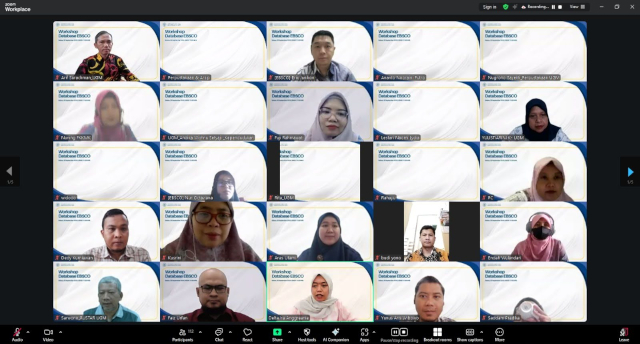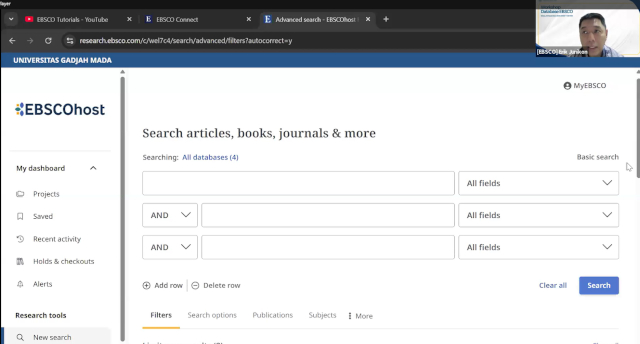
High-quality research begins with reliable sources. This was the key message that emerged during the EBSCO Database Workshop, held virtually via Zoom on Tuesday (September 30, 2025). The training featured Erik Junikon, Regional Sales Manager of EBSCO International, and was attended by students, researchers, and academics within UGM who were eager to enhance their information literacy skills.
Opening the session, Head of UGM Library and Archives, Arif Surachman, SIP., MBA., encouraged the academic community to make full use of databases that have been subscribed to by the university. “Databases like EBSCO are valuable academic investments. We urge students, researchers, and lecturers to maximize their use so that the benefits can truly support research and innovation at UGM,” he said.
Over the course of two hours, participants were equipped with effective strategies for searching academic articles, finding quality references, and maximizing EBSCO’s advanced features for research and academic writing. “EBSCO is one of the largest academic databases in the world, providing thousands of full-text journals, scholarly articles, and academic literature that can strengthen research foundations,” explained Erik.
He emphasized that efficient research depends not only on access to sources but also on the right search strategies. “A well-designed query can save hours of time and help researchers find the information they truly need,” he added.
Participants were also introduced to practical tools such as advanced filtering, citation export functions, and subject-based indexing to streamline their research process. The training addressed common challenges faced by the academic community in filtering information amidst the digital data overflow.
Furthermore, the workshop highlighted the importance of global knowledge access in supporting the Sustainable Development Goals (SDGs). Expanding access to credible scholarly resources aligns with SDG 4 (Quality

Education) by ensuring inclusive and equitable learning. At the same time, fostering digital literacy and utilizing knowledge infrastructure are closely tied to SDG 9 (Industry, Innovation, and Infrastructure). Collaboration with international database providers also reflects SDG 17 (Partnerships for the Goals).
Closing the session, Erik reminded participants of the value of search strategies in producing quality academic work. “Good research is built on good information, and good information comes from credible sources that are properly managed,” he concluded.
This workshop reaffirms the commitment of UGM Library and Archives to continuously equip its academic community with digital research skills, in order to foster a research ecosystem that is more transparent, inclusive, and sustainable.
Contributor: Wasilatul Baroroh
